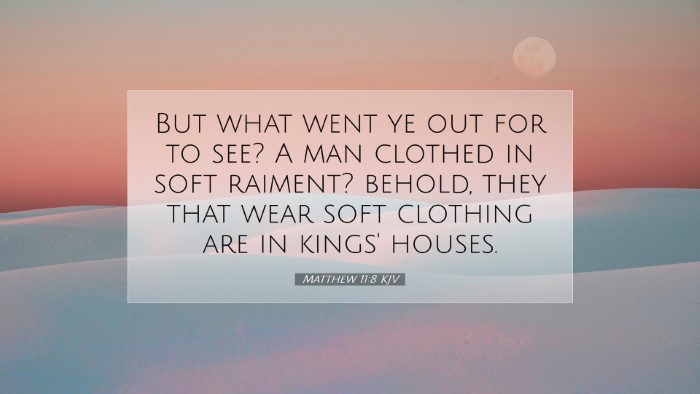Commentary on Matthew 11:8
Matthew 11:8 states: "But what went ye out for to see? A man clothed in soft raiment? behold, they that wear soft clothing are in kings' houses." This verse is part of a larger discussion where Jesus addresses the crowd concerning John the Baptist's role and his unique character as a prophet.
Introduction to the Context
This verse follows a series of inquiries and statements by Jesus regarding John the Baptist's ministry. It serves both as a rhetorical question and a reflection on societal expectations of prophets and religious figures.
Interpretation and Analysis
The insights gathered from various public domain commentaries reveal several layers of meaning in this verse.
Matthew Henry's Commentary
According to Matthew Henry, the question posed by Jesus emphasizes the contrast between John the Baptist's austere lifestyle and worldly expectations of a prophet. Henry articulates that John, embodying humility and simplicity, did not seek the comforts and luxuries of the palace. Instead, his ministry was marked by authenticity and dedication to the call of God.
- Austere Lifestyle: John wore camel's hair and consumed locusts and wild honey—symbols of his rejection of the extravagant.
- Challenge to Expectations: Jesus highlights that true prophetic ministry does not align with societal standards of wealth and influence.
Albert Barnes' Insights
Albert Barnes provides a complementary perspective, asserting that Jesus' question lays bare the assumptions of the crowd about what a prophet should look like. By mentioning "soft raiment," Barnes suggests the societal connotation tied to power and prestige that often misleads people regarding spiritual authority.
- Spiritual Authority vs. Worldly Power: Barnes emphasizes the idea that true authority in God's kingdom is not demonstrated through luxury but through humility and faithfulness to God's call.
- Invocation of Reflection: The rhetorical nature of Jesus' question invites the audience to reflect on their expectations and understanding of God's messengers.
Adam Clarke’s Observations
Adam Clarke provides further depth by detailing the cultural context. Clarke notes that the attire of a prophet within Jewish tradition was significant and often denoted one's standing before God. John’s lack of soft clothing symbolizes his utter dependence on God rather than human establishment.
- Cultural Context: Clarke notes the prevalent Jewish idea that physical appearance signified one's spiritual stature, which John subverted.
- Mission of John the Baptist: Clarke highlights John's role in calling sinners to repentance—a calling that contrasts sharply with living in luxury.
Theological Implications
The combined insights of these commentators suggest profound theological implications for understanding prophetic ministry today:
- Authenticity vs. Appearance: The verse challenges modern interpretations of success in ministry, underscoring that genuine commitment often diverges from the allure of popularity and material wealth.
- Critique of Consumerism: In a contemporary context, the passage remains a poignant critique of consumerism within the church, urging a return to simplicity and authenticity in worship and leadership.
- Reflective Questions for Leaders: Pastors and church leaders are encouraged to reflect on their own motivations and lifestyle choices in light of John’s example.
Conclusion
Matthew 11:8 invites believers into a deeper understanding of what it means to follow God's calling. With contributions from Henry, Barnes, and Clarke, it becomes clear that Jesus' rhetorical question serves as a powerful reminder that true prophetic voices arise from lives steeped in humility and dedication to God's mission rather than the allure of wealth and prestige. For pastors and theological students, this verse reinforces a foundational principle in ministry: authenticity over appearances.


